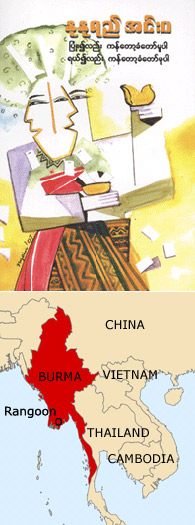Nu Nu Yi's Smile as they bow narrowly missed winning - last week the inaugural Man Asian Literary Prize went to a Chinese book set during the Cultural Revolution - but her novel about a gay transvestite medium is a fascinating insight into Burma's gay community.

Top: A winner of Myanmar's National Literary Award, Smile as they bow which was first published in 1994 follows the lives of three young Myanmar people. It has been translated into English and will be published at a later date. According to Irrawaddy, an independent Burmese news magazine, the novel was originally rejected by Burma's state censors in 1993 but was later given permission to distribute a heavily redacted version the following year. Attempts to create a film adaptation were blocked by Burma's Motion Picture Censor Board. The author Nu Ny Yi was quoted as saying: ''The authorities said the story was against the customs of Theravada Buddhism and Burmese culture. They also said being born a man is an honour, and that a person living as a gay man loses that honour.''
"It's a melodramatic show," says "Bowie," a gay Burmese businessman who operates his own tour guide company in the country."Some of the gay guys are in their element when they become a nat-kadaw."
While it's no Thailand, most observers say Burma has a history of being fairly gay tolerant. Even though the legality of homosexuality appears to be a grey area - the British government and exile groups say gay sex is illegal, although locals say they have never heard of anybody being punished for being gay.
"It's a gay friendly country - gay acts are not targeted," Bowie says. "But like anything, [the government] can use it against you if they want."
Gay couples should avoid public displays of affection, he says. "There is no hostility, there is no confrontation, although some people ridicule gays and transsexuals." But the main pressure for Burma's gays is from their family.
"There is a huge inbuilt respect for parents," he says, adding that although there is not a major push to get married and have children - as there is in neighbouring China - many gays remain closeted because they do not want to embarrass their parents by being openly gay.
Gay tourists should find the country welcoming, says Gerry of gay-friendly Mandalaytravel.com. While his company doesn't take clients around gay bars - "we want our guests to visit [Burma] for the culture and the beauty of the countryside and people" - he says the company employs some gay tour guides who are able to talk about gay life in Burma.
"I can assure you Myanmar is gay-tolerant," he adds. [Burma was renamed Myanmar by the military junta in 1989.]
"On the outside the Burmese look very conservative but having been there for many years I can assure you the opposite is true."
There is also a burgeoning gay scene in Rangoon - the former capital. The place to go, says Bowie, is Pioneer, inside the Yuzana Garden Hotel. Pioneer is a scruffy club downtown that plays 90's techno music. It also caters to Burma's straight middle class - watch out for businessmen drunk on brandy and young kids on drugs.
"You cannot miss the boys snogging on the dance floor on Fridays and Saturdays," jokes Bowie. "It's half gay these days."
Rangoon does not have extensive nightlife choices - the poverty stricken population can barely afford to feed themselves never mind have money left over to party on the weekend. But there is a thin layer of middle class and a small group of mainly hotel bars and clubs offer the best chance outside of Pioneer of meeting other gays.
BME, a fairly seedy option in the City Lake View Hotel, around the corner from detained opposition leader Aung San Suu Kyi's house on University Avenue - is a popular choice. However, since the protests it has remained closed - the road leading to the hotel is barricaded and guarded by armed troops- the area around Suu Kyi's house is just too sensitive for public access.
Meanwhile, DJ Bar, is a funkier and more upmarket venue. It also usually has a decent DJ and is popular with the expatriate population. "Any foreign gay men will get a lot of attention in Burma," laughs Bowie. "They are all looking for someone 'generous'!"
And in a country where the average daily income is less than a US$1, who can blame them?
